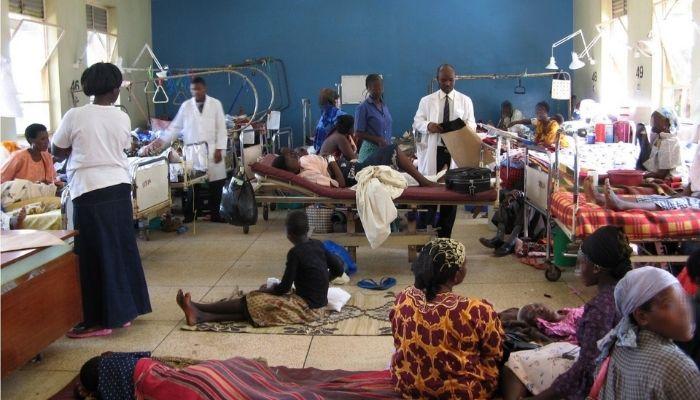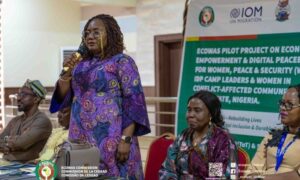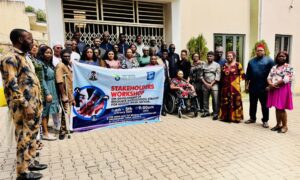BY ABIEMWENSE MORU
In Enugu state, a 34-year-old mother of two, Mrs Sarah Njoku, sought medical attention at a general hospital for what she believed was a migraine.
Upon arrival, her medical records were taken by a nurse, and was advised to wait.
Hours later, a doctor finally examined her, administering two tablets without conducting a thorough medical evaluation.
Subsequently, she was discharged home. Regrettably, later that evening, Njoku experienced a collapse.
Her husband rushed her back to the hospital, only to be informed that the oxygen supply had been exhausted, and the CT machine was malfunctioning.
As a result, they were advised to seek medical assistance at a private facility situated over 20 kilometres away.
Sadly, she died during her transportation to the alternative facility.
A post-mortem revealed she had suffered a brain aneurysm; something that might have been diagnosed and treated had timely and accurate care been available.
Sarah’s tragic story reveals the need to improve patient safety and care delivery in Nigerian hospitals.
Analysts say the issue is not only the human cost of systemic inefficiencies, but also the opportunity to build a more responsive, compassionate and well-equipped health system.
Indeed, recent data highlight the scale of the challenge.
The World Health Organisation (WHO) estimates that unsafe care in hospitals across low- and middle-income countries causes about 134 million adverse events and 2.6 million deaths each year.
Specifically, in Nigeria, hospital studies show that healthcare-associated infections affect around 14 per cent of admitted patients, compared with about 7 per cent in England and across the EU.
Furthermore, medication errors are common.
One audit found that three-quarters of prescriptions contained at least one mistake, while another survey reported that 42.8 per cent of Nigerian clinicians admitted to committing a medical error, most often in prescribing.
Underlying these risks is a shortage of health workers.
For instance, Nigeria has fewer than 0.4 doctors and 1.7 nurses per 1,000 people, far below the WHO benchmark of 2.5 and well behind countries like the United Kingdom, where the ratios are several times higher.
In recent years, medical experts and advocates have therefore called for a transformation that centres the patient.
This means more than treating illness; rather, it requires compassion, clear communication and trust at every encounter.
Most Rev’d Henry Ndukuba, Primate of the Church of Nigeria, Anglican Communion, emphasised this human dimension at a recent health summit in Abuja, stressing that the heart of quality healthcare is empathy and professional ethics.
According to him, many patients do not die for lack of medical knowledge, but for want of compassion and accountability.
His vision is one in which hospitals return to their role as sanctuaries of healing, not fear.
In that spirit, religious institutions such as the Anglican Church are taking practical steps.
He noted that plans are under way to establish a Health Maintenance Organisation (HMO) and a Health Professionals’ Guild to offer ethical, affordable care grounded in compassion.
Therefore, initiatives like this help to reinforce the idea that patient safety starts with values-based care.
Accurate diagnosis, he argues, is a pillar of patient safety. Global evidence backs this up.
In Nigeria, however, many doctors admit to facing diagnostic challenges because of outdated equipment or insufficient tools.
Dr Adewunmi Alayaki, former Secretary of the Nigerian Medical Association (NMA), noted that several government hospitals still rely on machines from the 1980s.
“This not only reduces diagnostic accuracy but also puts doctors in difficult positions, forcing them to rely on unreliable data,” he said.
According to him, modernising hospital infrastructure is essential.
“Investing in functional CT scanners, reliable laboratory equipment and digital patient records, alongside training staff to use them, would enable accurate and timely diagnoses and ultimately save lives.
“Behind every effective hospital, of course, is a team of skilled, motivated and well-supported professionals.
Yet in Nigeria, staff shortages and burnout are persistent challenges.
“Many doctors and nurses work double or triple shifts, with little rest or institutional support,” Dr Alayaki said.
Similarly, Dr Mariam Shiru, President of the Association of Resident Doctors at the University of Ilorin Teaching Hospital, expressed concerns.
“Doctors are working two to three times more than they should. Fatigue is real, and mistakes are inevitable,” she said.
She therefore stressed the need to recruit more health workers, improve working conditions and provide ongoing training.
Updated curricula, mentorship and continuous professional development, she added, would empower practitioners to stay current with best practice.
“Medical errors, whether diagnostic or procedural, must be addressed through a framework of accountability designed not to punish, but to improve”.
In the same vein, legal experts believe that accountability is key to safer care.
Mr Muhammed Abdulsalam, a lawyer, called for full implementation of the National Health Act (2014) and the Medical and Dental Practitioners Act (2004), which set out patient rights and professional responsibilities.
He argued that systemic accountability encourages a culture of learning rather than blame.
Stronger hospital management, better laboratory protocols and transparent reporting systems, he said, would reveal patterns of error and prevent future harm.
Medication errors remain another area of concern.
Pharmacist Ishaku Dunama noted that counterfeit and expired drugs still make their way into pharmacies due to weak regulation.
For this reason, he said regulatory agencies should be strengthened, inspections increased and pharmacies equipped with tools to verify authenticity.
Digital tracking systems and barcodes, he added, could reduce the circulation of expired or fake medicines.
“The safety and efficacy of medicines must be guaranteed if patient trust is to be restored,” he said.
Beyond government institutions, communities and faith-based organisations also have a crucial role to play in promoting values and holding institutions to account.
When religious leaders speak about compassion and ethics, as Primate Ndukuba has done, they shape public expectations and can spur reform.
In addition, civil society groups fill vital gaps by running mobile clinics, advocating for patients and hosting community health education programmes.
These initiatives complement public services and improve outcomes, especially in underserved areas.
Reliable infrastructure; steady power, clean water, functional equipment and accessible facilities is equally essential.
Yet, in many rural and urban centres, outdated infrastructure continues to hinder timely treatment.
Health experts insist that government prioritise infrastructure development as a matter of public safety.
They believe that public-private partnerships, donor support, and more effective budgeting can be harnessed to build resilient, well-equipped hospitals capable of delivering twenty-first century care.
Ultimately, improving patient safety in Nigerian hospitals requires a shift in mindset, from resignation to responsibility and reform.















